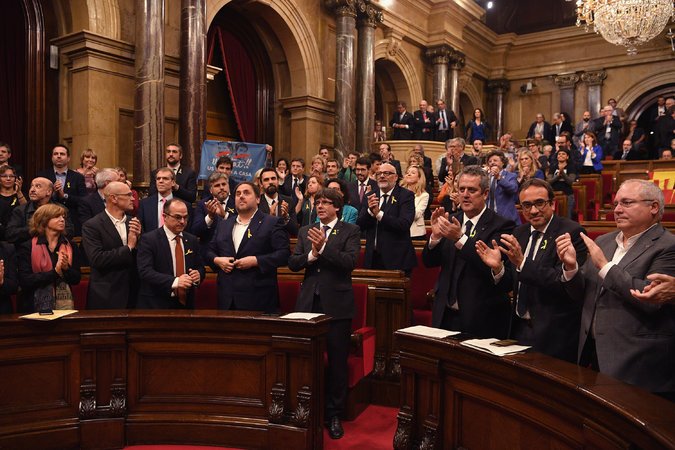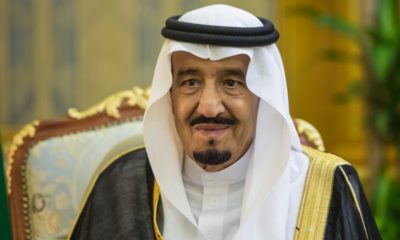Government
Spain Dismisses Catalonia Government After Region Declares Independence
Published
7 years agoon

BARCELONA, Spain — Spain’s leader fired the government of the rebellious Catalonia region Friday, dissolved the regional parliament and ordered new elections after Catalan lawmakers illegally declared an independent nation.
The showdown escalated the biggest political crisis in decades to hit Spain, which is just emerging from a prolonged economic malaise. Catalonia is a critical part of the economy in Spain, the fifth largest in Europe.
“We never wanted to reach this situation, never,” Prime Minister Mariano Rajoy said on television, announcing the emergency steps he was taking under the Constitution to crush Catalan independence.
Mr. Rajoy’s move capped a frenzied day of political maneuvering in Madrid, Spain’s capital, and Barcelona, the capital of Catalonia, where the long drive for independence — illegal under Spain’s Constitution — has now reached its fiercest level yet.
Whether the separatist emotion behind the independence declaration will now grow or fade could depend on how aggressively the central authorities in Madrid enforce the takeover in coming days.
As of Friday night it was unclear whether separatist leaders — who hours earlier exulted at the independence declaration — would resist. The mood in the city of Barcelona was a mix of intense joy and subdued trepidation.
“We believe it is urgent to listen to Catalan citizens, to all of them, so that they can decide their future and nobody can act outside the law on their behalf,” Mr. Rajoy said.
The steps announced by Mr. Rajoy mean Spain will take direct control over one of the country’s autonomous regions for the first time since Spain embraced democracy under the 1978 Constitution.
At the end of what he called “a sad day” for Spaniards, Mr. Rajoy assured them that he had the means to end a secessionist threat that, he said, was based on “lies, frauds and impositions.”
He removed the Catalan leader, Carles Puigdemont, and his cabinet, as well the director general of the autonomous police force. He also ordered Catalonia’s representative offices overseas to close.
In ordering the Catalan Parliament to dissolve, Mr. Rajoy said new regional elections would be held Dec. 21.
Pending the elections and formation of a new regional government, Mr. Rajoy said, Catalonia’s administration would be run from Madrid.
Fueled by a distinct language and culture as well as economic grievances, aspirations for a separate state have percolated for generations in Catalonia before boiling over this month.
The events on Friday, coming in the chaotic aftermath of an Oct. 1 independence referendum in Catalonia, were greeted variously with anger, concern and elation on both sides, with the prospect of even more volatile confrontations in days ahead as the Spanish government moves to put the steps in place.
Spain’s attorney general may now seek to detain Catalan leaders on grounds of rebellion.
Such moves were likely to turn the boisterous separatist street celebrations that greeted the independence declaration on Friday into mass protests, with one Catalan labor union already calling on workers to stage a general strike on Monday.
During the debate in the regional parliament that preceded their vote for independence, Catalan lawmakers traded accusations and in turn described the occasion as “historic” and “happy,” or else “tragic” and a violation of Spain’s Constitution — perhaps the only thing on which both sides agreed.
Within an hour, the Spanish Senate in Madrid voted 214 to 47 to invoke Article 155 of Spain’s Constitution, granting Mr. Rajoy extraordinary powers to seize direct administrative control over the region and remove secessionist politicians, including Mr. Puigdemont, the Catalan leader.
In a speech on Friday before the vote, Mr. Rajoy had said he had “no alternative” because Mr. Puigdemont and his separatist government had pursued an illegal and unilateral path that was “contrary to the normal behavior in any democratic country like ours.”
Undeterred by Mr. Rajoys threat, and after a bitter debate, separatists in the Catalan Parliament passed a resolution to create “a Catalan republic as an independent state.”
Most of the opponents to independence walked out of the chamber in protest before the vote, which the remaining lawmakers held via secret ballot, aware that declaring independence from Spain could risk arrest.
The final tally was 70 in favor, 10 against, and two blank votes.
Since the referendum , Mr. Puigdemont had been squeezed in a tightening vise of his own creation, and seemed at times to contradict his own declarations as he squirmed for a way out.
Mr. Puigdemont, a former small city mayor, was trapped between the demands from Catalan hard-liners to declare independence on one side, and, on the other side, the stiffening response from a Rajoy government determined to preserve the nation’s Constitution and territorial integrity.
Despite pleas for mediation, he and his region’s independence bid were shunned and condemned, not only by Madrid but also by European Union officials wary of encouraging similarly minded secessionist movements around the Continent.
European leaders made clear on Friday that they would not be recognizing Catalan independence and would support Mr. Rajoy, as leader of one of the bloc’s most important member states. Donald Tusk, the president of the European Council, wrote in a Twitter post that “nothing changes” and “Spain remains our only interlocutor.”
Searching for a compromise, Mr. Puigdemont came close on Thursday to calling early regional elections in hopes of forestalling the drastic measures approved by the Spanish Senate on Friday and preserving Catalonia’s autonomy.
But Madrid would offer no guarantee that it would not clamp down on the region, Mr. Puigdemont said, as he immediately faced a revolt in his own ranks from secessionist hard-liners who called him a traitor.
After hours of wavering on Thursday, he relented and threw the decision on independence to Catalan lawmakers, who took the fateful plunge on Friday.
Addressing the Catalan Parliament in Spanish, Carlos Carrizosa, a lawmaker from Ciudadanos, a party that opposes secession, told Mr. Puigdemont and separatist lawmakers that, far from creating a new Catalan republic, “you will go down in history for having fractured Catalonia and for sinking the institutions of Catalonia.”
In front of the assembly, he tore apart a copy of the independence resolution. “Your job is not to promise unrealizable dreams but to improve the daily lives of people,” he said.
Before the independence vote, Marta Rovira, a separatist lawmaker, told the assembly that “today we start on a new path” to build “a better country.” She added, “We are creating a country free of repression.”
Catalan lawmakers who voted for independence could face prosecution for sedition, or even rebellion.
Marta Ribas, a Catalan lawmaker, said that Madrid’s use of Article 155 was unjustified, but also argued that “it’s a mistake to respond to one outrageous act with another outrageous act.”
She added, “A declaration of independence won’t protect us from the 155, quite the contrary.”
In the streets outside the Catalan Parliament in Barcelona, not far from a boisterous pro-independence rally, a few Catalans quietly expressed similar frustrations.
The Oct. 1 referendum did not give the Catalan government the legitimacy to vote to secede, said Federico Escolar, 53, a cafe owner.
“Most of the people who would have voted no did not participate,” Mr. Escolar said, while smoking a cigarette outside his cafe. “It was not a proper referendum. It was illegal.”
Walking into a nearby subway station, Cristina Juana, a 38-year-old social worker, agreed.
“Neither Puigdemont nor the Catalan government knows exactly what the Catalan people’s opinion is,” Ms. Juana said.
Before the Catalan Parliament’s vote for independence on Friday, large crowds had gathered outside in anticipation of what they hoped would be a historic day for Catalonia.
Many were draped in flags as they watched the parliamentary debate on two large screens, cheering during speeches by pro-independence lawmakers and hissing those of their opponents. When proceedings hit a lull, the crowds cycled through a series of pro-independence chants.
“Spanish occupiers!” was one, a reference to the national police officers who tried to stop the Oct. 1 referendum by force. “Leave Catalonia!”
Is the CEO and Founder of Investors King Limited. He is a seasoned foreign exchange research analyst and a published author on Yahoo Finance, Business Insider, Nasdaq, Entrepreneur.com, Investorplace, and other prominent platforms. With over two decades of experience in global financial markets, Olukoya is well-recognized in the industry.

You may like
-


EU Raises Tariff on Chinese Electric Vehicles by 35%
-


Stoxx 600 Falls as Tech Sector Drags Down European Markets
-


G-7 Faces Saudi Resistance on Russian Asset Seizure Plans
-


Euro Drops Amid Projections of Left-Wing Win in French Elections
-


Euro Dips to Month-Long Low After Macron Calls Snap Vote
-


EU Secures €50bn Financial Support for Ukraine as Orbán Lifts Veto



